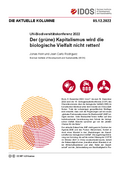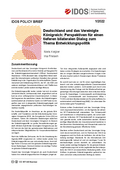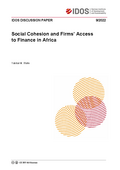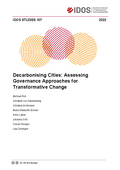-

Publikationen
Photo: www.shutterstock.com/de/image-photo/pont-du-gard-old-roman-aqueduct-45688924
Publikationen
Das German Institute of Development and Sustainability (IDOS) gibt vier eigenständige Publikationsreihen heraus. In Discussion Papers, Policy Briefs und Studies veröffentlichen die Wissenschaftler*innen des IDOS ihre aktuellen Forschungsergebnisse. Auch Gastwissenschaftler*innen und Kooperationspartner haben die Möglichkeit, ihre Forschungsergebnisse in einer der IDOS-Reihen zu publizieren. Publikationen der 2022 eingestellten Reihen Analysen und Stellungnahmen, Briefing Paper sowie Two-Pager / Zweiseiter sind weiterhin online verfügbar. Die vierte Publikationsreihe ist für Meinungsbeiträge vorgesehen: Regelmäßig kommentiert die Aktuelle Kolumne die neuesten Entwicklungen und Themen der internationalen Entwicklungspolitik.
Wissenschaftler*innen des IDOS veröffentlichen ihre Forschungsergebnisse zudem regelmäßig in referierten und nicht referierten deutschen und internationalen Fachzeitschriften und Publikationsreihen anderer Forschungseinrichtungen und Institutionen sowie bei renommierten Buchverlagen. Zusätzlich nutzen sie Blogs und Online-Plattformen der Partnerinstitutionen, um die Forschungs- und Beratungstätigkeit des Instituts einer interessierten Öffentlichkeit zu vermitteln.
Es wurden 9409 Ergebnisse gefunden. Zeige Ergebnisse 891 bis 900 von 9409.
-
Transnational networks as relational governance infrastructure
-
The opportunities and challenges of Industry 4.0 for industrial development: a case study of Morocco’s automotive and garment sectors
-
Vier Vorschläge zur Stärkung der deutsch-französischen Zusammenarbeit gegenüber Afrika
-
Wie Kooperation im Klimaschutz (nicht) gelingt
-
Topic modelling exposes disciplinary divergence in research on the nexus between human mobility and the environment
-
Localising the SDGs in India: the role of government and private training institutes
-
Towards a digital development partnership that meets African interests
-
Der Zweck der UN-Reform ist noch nicht überall angekommen
-
Green Hydrogen: fuelling industrial development for a clean and sustainable future
-
Green Hydrogen: Fuelling industrial development for a clean and sustainable future












